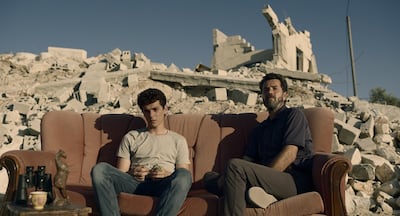Children's films should be more than fluffy entertainment, according to Sheikha Jawaher bint Abdullah Al Qasimi. As director general for the Sharjah International Film Festival for Children and Youth, Sheikha Jawaher believes that content should provoke and challenge young minds to consider the world around them.
“It’s not just me that thinks this way but the children as well if we listen to them,” Sheikha Jawaher, who is a member of the Sharjah ruling family, tells The National. “I also view my children as an example. When I take them to the usual happy film they walk out saying: 'Oh, that was boring.' Or: ‘It was nice.'
"The truth is children are actually more open-minded and stronger than we think. They want to see inspirational stories that talk to their generation and about people who make a difference. It should be more than just watching the usual films we take our kids to."
For the last 11 years, the festival has been filling the gap with a dynamic and international programme of feature-length and short films made for children and, in some cases, by children.
Running until Saturday at City Centre Al Zahia, the festival features 100 films from more than 90 countries ranging from the UAE and Egypt to South Korea and Zimbabwe.
With Palestine designated as the country of honour, a selection of films and discussions are being held exploring its culture and cinematic history. One of the country's entries is The Teacher by British-Palestinian filmmaker and human rights activist Farah Nabulsi.
The diversity of the programme is a token of pride, Sheikha Jawaher notes, indicating how far the festival has grown since launching. "When the festival first began, we had nearly 100 submissions to choose from and I remember feeling over the moon at that," she recalls. “This year we had more than 2,000 submissions so the decision process regarding what films to choose became more difficult."

Another reason for the rigorous selection is that the role of the festival has evolved over the decade. With such a vibrant and vulnerable audience to cater for, Sheikha Jawaher says the curatorial team spend more time combing international film festivals, including Cannes, to find the right mix of innovative and stimulating content to bring to Sharjah.
One thing learnt in the process is to bring children films that show the world as it really is. Hence, the move to show a series of international short films depicting the lives of refugees as part of this year’s programme.
"We can’t tell our children to cover their eyes or hide what is happening out there because they will be exposed to it in school or social media," she says. "So I think our role as parents and as a festival is to put everything out there and discuss it. And that is the power of film because you are able to show young people the consequences of bad decisions before they do it."
Sheikha Jawaher points to the three-minute short film Taesh, made by 12-year-old Emirati filmmaker Ali Alloghani and screened on Tuesday, as a good example of showing and not telling.
"I asked the director what this film is about and he says it's about being reasonable when you drive, not speeding and what happens when you do," she says. "So even as a young filmmaker, he's actually thinking of showcasing what can go wrong. That's more effective than only a public safety announcement stating: 'Please drive safe and wear your seatbelts.'”
With the festival ending on Saturday and awards given to categories including feature films, international and Arabic short films as well as films made by children and young people, Sheikha Jawaher says the festival is only beginning to reap the benefits of its mission.
"A lot of the time, filmmakers who show their work with us are as young as 10," she adds. "So that generation who was with us when we started in 2013 would be 20 or 21 now and I know that we have planted that seed in them to make great films and tell their stories. I am very excited about the future and I do think the best is coming."


